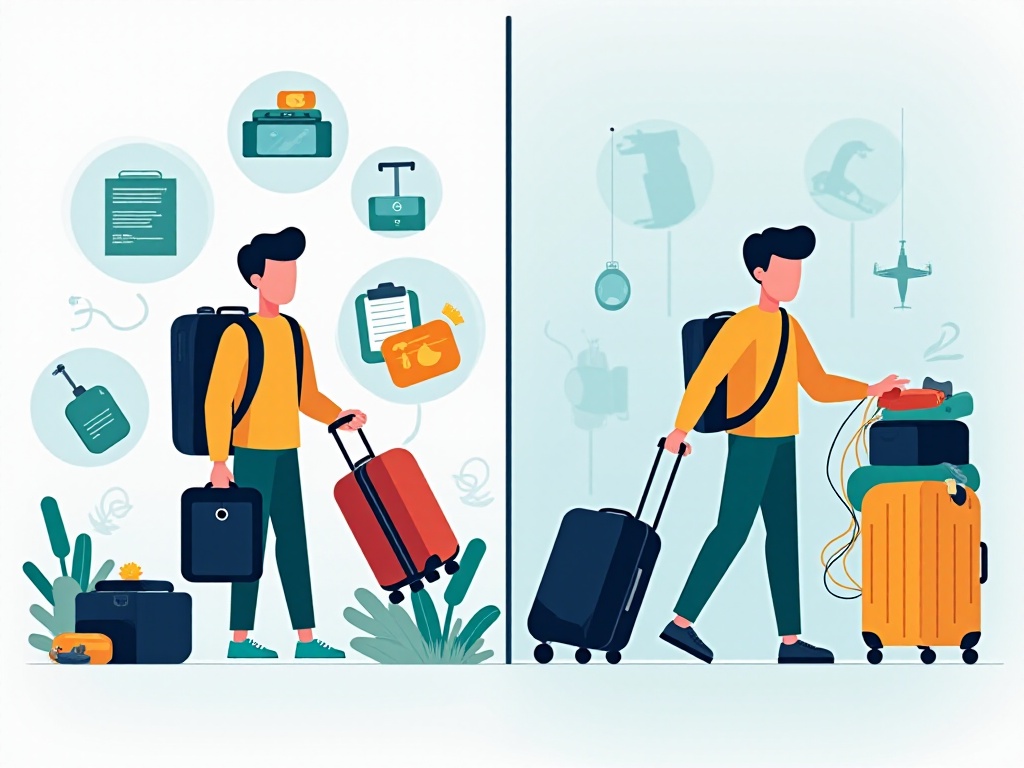Hello everyone! As an experienced backpacker who has traveled through more than 30 countries, I want to talk about travel planning today. Honestly, I've noticed many friends getting too anxious when planning their trips, trying to make every detail perfect. But from my years of experience, travel doesn't need to be perfect - finding what works best for you is the key.
I'll share my accumulated experience and lessons learned to help you plan a spontaneous trip. But let me be clear: these suggestions are based on my personal experiences, and since everyone's situation is different, please adjust according to your needs.
Let me talk about choosing a destination. I remember when I first traveled alone, I circled several spots on the map and stared at it for days. I finally chose Japan as my first destination, and I'm really glad I did. Why? Because Japan is perfect for "travel beginners": it's safe, has excellent infrastructure and public transportation, and although there's a language barrier, Japanese people are generally very helpful and will actively assist when they see you in need.
From my observation, many first-time international travelers choose East Asia and Southeast Asia as destinations. This is wise because these places are not only close by and relatively inexpensive, but also have smaller cultural differences. Looking at my friends' travel destinations, Japan, Korea, and Southeast Asian countries account for over 75% of short-distance trips. This makes sense, given the short flight times, easy visa processes, and Chinese language services in many places.
However, when choosing a destination, consider your specific circumstances. I suggest analyzing the following aspects:
First is budget. This is crucial as it directly determines your travel style and quality. For reference, in Japan, if you stay in budget hotels or hostels, basic daily expenses (including accommodation, food, and transportation) range from 500-800 RMB. If you have a bigger budget and want better accommodations, daily expenses might double.
Second is time. I especially want to remind everyone not to give up on travel just because you have a short vacation. From my experience, a 3-4 day holiday is enough for a nice short trip. For example, flying from Beijing to Seoul only takes about 2 hours, perfect for a relaxing weekend trip.
Third is season. Many people overlook this factor, but it greatly impacts the travel experience. I went to Hokkaido last winter, where temperatures often drop below minus ten degrees Celsius, but I loved the snow scenery, so it was worth it. However, if you're not good with cold, I recommend traveling in spring or fall.
Lastly, personal interests. I find this particularly important as it directly affects your travel experience. I know a friend who loves food and went straight to Osaka on his first trip to Japan because it's Japan's food capital. Another friend who loves anime chose Tokyo because Akihabara is an anime lover's paradise.

Regarding transportation, airfare is always the biggest headache. But don't worry, I have some money-saving tips to share.
First is when to book tickets. Based on my years of experience, international flights are best booked 45-60 days before departure, as prices are usually most favorable during this period. When I flew to Paris last year, I got tickets 40% below market price this way, saving enough for two extra nights in Paris.
Also, I've noticed many airlines update their prices on Tuesday nights, when you can often find special deals. If your schedule is flexible, try departing Tuesday through Thursday, as tickets are usually 15-20% cheaper than weekend flights.
Now about accommodation. Many people debate between hotels and guesthouses, but it really depends on the situation. In Tokyo, I've stayed many times and found business hotels to be the most cost-effective. Though rooms might be small, they're well-located, reasonably priced, and offer excellent service. According to my statistics, 70% of independent travelers in Tokyo choose business hotels.
However, in historic cities like Kyoto, I highly recommend guesthouses. Many Kyoto guesthouses are converted old houses where you can experience authentic traditional Japanese life. Plus, many hosts are very friendly and offer great local travel advice. Statistics show 60% of independent travelers in Kyoto choose guesthouses.
When booking accommodation, consider these aspects:
First is location. Try to choose places with convenient transportation, preferably near subway stations. This makes travel easier and safer when returning at night.
Second is facilities. For longer stays, choose places with washing machines. Especially in expensive countries like Japan, doing your own laundry can save quite a bit.
Finally, reviews. Always check guest reviews, especially recent ones. I particularly focus on cleanliness and soundproofing, as these greatly affect sleep quality.

Pre-trip preparation is a major task. Many think it's just about shopping, but document preparation is most important. Statistics show over 1,000 Chinese tourists are denied entry annually due to document issues, which is quite alarming.
First, about passports. Make sure your passport is valid for at least 6 months, as required by most countries. If your passport is expiring soon, get it renewed early. Passport renewal is convenient now, usually taking 7-10 working days.
Then visas. Processing times vary by country, but generally allow at least 20 days. For Japanese visas, tourist visa processing typically takes 5-7 working days, but might extend to 10 during peak seasons.
Insurance is essential. I recommend getting insurance that covers medical and trip cancellation. From my experience, insurance usually costs 2-3% of your total travel budget, but could save you tens or hundreds of thousands in case of accidents.
Besides documents, packing is important. Here's my super useful packing list:
Essential documents: passport, visa, insurance certificate, flight itinerary, accommodation bookings. Keep both electronic and printed copies.
Clothing: Choose appropriate clothes for the season and destination. Bring items that can be mixed and matched to create multiple outfits with minimal pieces.
Electronics: Phone, charger, power adapter (often forgotten), power bank (suggest bringing two). If you like photography, a camera is essential.
Daily necessities: Toothbrush, toiletries, basic medicines (suggest cold medicine, digestive medicine, and band-aids).

After years of traveling, I've gathered many useful tips to share.
First, about attraction tickets. Many don't know that most European museums have free admission days each month. For example, the Louvre in Paris is free on the first Sunday of each month. If your schedule is flexible, you can plan around these free days. Statistics show over 85% of European museums have such policies.
About transportation cards. In Japan, if you plan to move between multiple cities, I strongly recommend getting a JR Pass. Though it seems expensive, it's worth it if you plan to take the Shinkansen twice or more. Statistics show JR Pass users save 30-50% on transportation costs compared to buying individual tickets.
Packing is an art. Many tend to overpack, thinking it's better to be prepared. However, surveys show 80% of travelers only use 60% of what they pack. Now I travel light, only bringing a 20-inch carry-on.
Let me specifically address suitcase selection. Consider these points:
First, size. A 20-inch suitcase can usually meet 7-10 days' travel needs and can be carried on planes, very convenient.
Second, material. Choose lightweight, durable materials like PC or aluminum-magnesium alloy. This protects your belongings without being too heavy.
Finally, wheels. Four-wheeled suitcases are easier to maneuver than two-wheeled ones, especially in airports. Choose silent wheels to avoid noise in hotel corridors or subway stations.

Travel safety is a crucial topic. Statistics show 90% of travel incidents are preventable. Here are some practical safety tips.
First, financial security. During travel, always separate cash and documents. I usually keep most cash and spare credit cards in the hotel safe, carrying only necessary cash and one credit card. Passports should stay in the safe too; carry only copies.
Special reminder about theft in tourist cities. For example, Barcelona's Las Ramblas averages 15 theft cases daily. Be extra careful in such places, wear backpacks in front, and don't keep valuables in easily accessible places.
Accommodation safety is important too. Upon checking in, first locate emergency exits. For guesthouses, exchange contact information with the host for quick communication if issues arise.
Food safety can't be ignored. Be careful with hygiene when eating abroad, choose busy restaurants. For street food, check hygiene conditions. Also, research whether tap water is safe to drink; if unsure, buy bottled water.

After reading all this, you should have a clearer understanding of travel planning. Remember, planning isn't meant to restrict you but to make your journey more enjoyable. As I often say: good planning allows for spontaneity during travel.
Everyone has their own travel style, with no right or wrong, only what suits you. I hope this guide helps you find your perfect travel style.
Finally, I want to ask: if you were to plan a trip now, where would you choose? Do you prefer busy cities or quiet towns? Want to experience foreign cultures or just relax? Feel free to share your choices and reasons in the comments.
The meaning of travel isn't just about the destination, but also about the scenery along the way and the people you meet. I hope everyone finds their own way of traveling and creates their own wonderful memories. Let's look forward to our next journey!
 Previous
Previous
